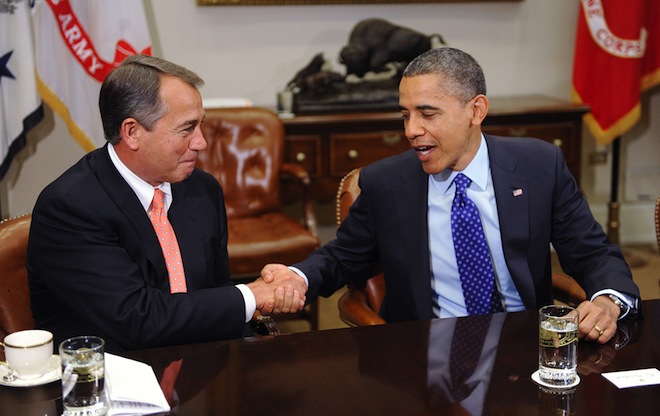President Obama won re-election on a campaign platform of raising tax rates on wealthy Americans. Republicans have conceded that they must fork over a fair amount of revenue, but can’t quite reconcile themselves to the idea of income tax rate increases. The Bush tax cuts are all set to expire. Defense and domestic spending will be cut across the board, including to Medicare providers, if Congress doesn’t act soon. Both parties insist they want to pass a bill that will reduce medium term deficits. But Obama also wants a bit more economic stimulus.
And, oh, yeah, the debt limit needs to be increased again.
These facts are the key ingredients in high-stakes budget negotiations taking place between Obama and congressional leaders right now. But they interact in complicated ways. And keeping the role each plays in negotiations can become confusing if all you know is that we’re approaching some kind of fiscal “cliff” and Congress needs to do something to avoid it.
So let’s look at them one at a time.
Taxes
This piece of the puzzle is the easiest to understand. Obama campaigned on a pledge to return the top marginal tax rate to its Clinton era level of 39.6 percent. He won. Under normal circumstances, Republicans would try to block him despite his victory. But it turns out all of the Bush tax cuts are expiring anyhow, so the issue really is how many of the cuts Congress and Obama want to keep. Obama’s brightest red line is that the top rate must go up. So it’s going up. The questions are: How high? Can Republicans convince Obama to agree to a lower rate if they make up the revenue gap by limiting tax benefits for high income earners? And will that final top rate get locked in before or after all the Bush tax cuts expire?
Sequestration
Sequestration is a fancy word for a bunch of messy spending cuts Congress timed to take effect in January that nobody actually likes but were intended to force the parties to work together on a more reasoned deficit reduction package to replace it. They haven’t done that yet. But whether the tax issues get resolved before or after the election, taxes are going up (see previous item). So it’s a fairly safe bet that Congress will use the budget breathing room that extra revenue gives them to delay or undo the sequester and deal with cutting Medicare, Social Security, and Medicaid, and maybe raising more tax revenue, in a separate process next year.
Debt Limit
If taxes are going up, and nobody really wants the sequester to take effect anyhow, that should be the end of the whole sorry fiscal cliff saga, right? Well, it might shake out that way. But then in a couple months the debt ceiling will have to be increased. Obama wants that taken care of now, before the end of the year — and ideally removed from the realm of legislative politics altogether. It’s hard to imagine him getting his way on that latter proposal. But House Republicans identify the need to raise debt limit as the one thing that can keep Obama from rolling them on budget issues completely. So if it’s going to be increased before the end of the year Republicans will demand some concession from Obama. Their favorite idea — for reasons uncertain — is increasing the Medicare eligibility age from 65-67. If there’s no deal before the end of the year, the White House insists it will not entertain a new round of debt limit hostage negotiations. House Speaker John Boehner will have to figure out a way to raise it cleanly.
Miscellaneous
If the debt limit isn’t increased before the end of the year, things could get ugly. The White House will refuse to negotiate for it; Senate Democrats will stand ready to increase it cleanly; and and House Republicans will be … well, nobody really knows. And if the country begins missing obligations to creditors, the economic consequences could be dire. That’s one reason Obama would prefer to cut a deal with Boehner to raise it now. Another is that Obama wants a few other things himself — and probably can’t get them unless he agrees to some unpopular cuts to popular social insurance programs. Obama wants to renew the payroll tax holiday for another year — or replace it with a similar, largely equivalent tax credit. He wants to extend emergency unemployment benefits. He wants $50 billion in additional stimulus spending. And he wants to lock in a bit more revenue than he’s guaranteed to get, by limiting tax expenditures for top earners. Put all of that together and it adds up to a far-reaching package of near-term stimulus and out-year deficit reduction — something Obama’s clearly been interested in for some time. But he’ll come up quite a bit short of the “big deal” he wants unless he gives Republicans concessions that progressives will hate. And they’re already gearing up to convince Democrats in Congress to block him if that’s the course he chooses to pursue.










